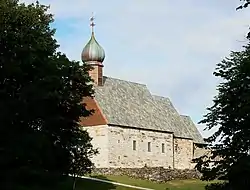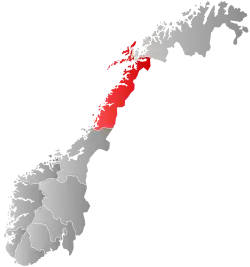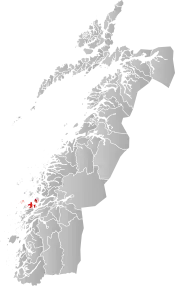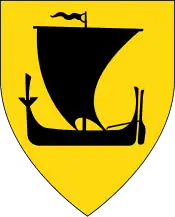Dønnes
Dønnes is a former municipality in the Helgeland traditional region in Nordland county, Norway. The 88-square-kilometre (34 sq mi) municipality existed from 1888 until its dissolution in 1962. The former municipality encompassed the northern part of the island of Dønna, the western parts of the islands of Tomma and Løkta, and over 300 smaller surrounding islands, islets, and skerries.[2][3]
Dønnes herred | |
|---|---|
 | |
 Nordland within Norway | |
 Dønnes within Nordland | |
| Coordinates: 66°12′13″N 12°35′14″E | |
| Country | Norway |
| County | Nordland |
| District | Helgeland |
| Established | 1 July 1888 |
| • Preceded by | Nesna Municipality |
| Disestablished | 1 Jan 1962 |
| • Succeeded by | Dønna Municipality |
| Area (upon dissolution) | |
| • Total | 88 km2 (34 sq mi) |
| Population (1962) | |
| • Total | 1,428 |
| • Density | 16/km2 (42/sq mi) |
| Demonym | Dønnværing[1] |
| Time zone | UTC+01:00 (CET) |
| • Summer (DST) | UTC+02:00 (CEST) |
| ISO 3166 code | NO-1827 |
Dønnes Church was probably built here at the request of Paul Vågaskalm who was governor of Alstahaug. It was built on the site of an older church sometime between 1200 and 1300. The characteristic onion dome was added in 1866. The church organ, built by Paul Christian Brantzeg, was installed in 1866.
History
Dønnes was established as a municipality on 1 July 1888 when the western part of the old Nesna Municipality was separated to form a new municipality. Initially, Dønnes had a population of 1,348. During the 1960s, there were many municipal mergers across Norway due to the work of the Schei Committee. On 1 January 1962 the municipality of Dønnes ceased to exist. The part of Dønnes on the island of Tomma (population: 80) was merged into Nesna Municipality. The remainder of Dønnes (population: 1,348) was merged with the part of Herøy Municipality on the island of Dønna (population: 19), Nordvik Municipality (population: 1,293), and the part of Nesna Municipality on the island of Løkta (population: 80) to become the new Dønna Municipality.[4]
Name
The municipality (originally the parish) is named after the old Dønnes farm (Old Norse: Dynjarnes) since the first Dønnes Church was built there. The first element is dynja which is the genitive case of the old name of the island of Dønna. The island name means to "rumble" or "roar" (referring to the swell of the waves on the island). The last element is nes which means "headland".[5]
Government
While it existed, this municipality was responsible for primary education (through 10th grade), outpatient health services, senior citizen services, unemployment, social services, zoning, economic development, and municipal roads. During its existence, this municipality was governed by a municipal council of elected representatives, which in turn elected a mayor.[6]
Municipal council
The municipal council (Herredsstyre) of Dønnes was made up of representatives that were elected to four year terms. The party breakdown of the final municipal council was as follows:
| Party Name (in Norwegian) | Number of representatives | |
|---|---|---|
| Local List(s) (Lokale lister) | 17 | |
| Total number of members: | 17 | |
| Party Name (in Norwegian) | Number of representatives | |
|---|---|---|
| Labour Party (Arbeiderpartiet) | 3 | |
| Christian Democratic Party (Kristelig Folkeparti) | 1 | |
| List of workers, fishermen, and small farmholders (Arbeidere, fiskere, småbrukere liste) | 1 | |
| Joint List(s) of Non-Socialist Parties (Borgerlige Felleslister) | 3 | |
| Local List(s) (Lokale lister) | 9 | |
| Total number of members: | 17 | |
| Party Name (in Norwegian) | Number of representatives | |
|---|---|---|
| Labour Party (Arbeiderpartiet) | 4 | |
| Christian Democratic Party (Kristelig Folkeparti) | 1 | |
| List of workers, fishermen, and small farmholders (Arbeidere, fiskere, småbrukere liste) | 2 | |
| Joint List(s) of Non-Socialist Parties (Borgerlige Felleslister) | 5 | |
| Local List(s) (Lokale lister) | 4 | |
| Total number of members: | 16 | |
| Party Name (in Norwegian) | Number of representatives | |
|---|---|---|
| Labour Party (Arbeiderpartiet) | 4 | |
| Communist Party (Kommunistiske Parti) | 1 | |
| Joint List(s) of Non-Socialist Parties (Borgerlige Felleslister) | 1 | |
| Local List(s) (Lokale lister) | 10 | |
| Total number of members: | 16 | |
| Party Name (in Norwegian) | Number of representatives | |
|---|---|---|
| Labour Party (Arbeiderpartiet) | 7 | |
| Joint List(s) of Non-Socialist Parties (Borgerlige Felleslister) | 6 | |
| Local List(s) (Lokale lister) | 3 | |
| Total number of members: | 16 | |
| Party Name (in Norwegian) | Number of representatives | |
|---|---|---|
| Labour Party (Arbeiderpartiet) | 6 | |
| Joint List(s) of Non-Socialist Parties (Borgerlige Felleslister) | 5 | |
| Local List(s) (Lokale lister) | 5 | |
| Total number of members: | 16 | |
| Note: Due to the German occupation of Norway during World War II, no elections were held for new municipal councils until after the war ended in 1945. | ||
References
- "Navn på steder og personer: Innbyggjarnamn" (in Norwegian). Språkrådet.
- Helland, Amund (1908). "Dønnes herred". Norges land og folk: Nordlands amt (in Norwegian). Vol. XVIII. Kristiania, Norway: H. Aschehoug & Company. p. 363. Retrieved 20 September 2018.
- Thorsnæs, Geir, ed. (24 March 2016). "Dønnes – tidligere kommune". Store norske leksikon (in Norwegian). Kunnskapsforlaget. Retrieved 22 September 2018.
- Jukvam, Dag (1999). "Historisk oversikt over endringer i kommune- og fylkesinndelingen" (PDF) (in Norwegian). Statistisk sentralbyrå. ISBN 9788253746845.
- Rygh, Oluf (1905). Norske gaardnavne: Nordlands amt (in Norwegian) (16 ed.). Kristiania, Norge: W. C. Fabritius & sønners bogtrikkeri. p. 109.
- Hansen, Tore; Vabo, Signy Irene, eds. (20 September 2022). "kommunestyre". Store norske leksikon (in Norwegian). Kunnskapsforlaget. Retrieved 1 January 2023.
- "Kommunevalgene og Ordførervalgene 1959" (PDF) (in Norwegian). Oslo: Statistisk sentralbyrå. 1960. Retrieved 18 March 2020.
- "Kommunevalgene og Ordførervalgene 1955" (PDF) (in Norwegian). Oslo: Statistisk sentralbyrå. 1957. Retrieved 18 March 2020.
- "Kommunevalgene og Ordførervalgene 1951" (PDF) (in Norwegian). Oslo: Statistisk sentralbyrå. 1952. Retrieved 18 March 2020.
- "Kommunevalgene og Ordførervalgene 1947" (PDF) (in Norwegian). Oslo: Statistisk sentralbyrå. 1948. Retrieved 18 March 2020.
- "Kommunevalgene og Ordførervalgene 1945" (PDF) (in Norwegian). Oslo: Statistisk sentralbyrå. 1947. Retrieved 18 March 2020.
- "Kommunevalgene og Ordførervalgene 1937" (PDF) (in Norwegian). Oslo: Statistisk sentralbyrå. 1938. Retrieved 18 March 2020.
External links
 Media related to Dønnes kirke at Wikimedia Commons
Media related to Dønnes kirke at Wikimedia Commons

